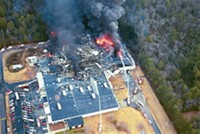Advertisement
Grab your lab coat. Let's get started
Welcome!
Welcome!
Create an account below to get 6 C&EN articles per month, receive newsletters and more - all free.
It seems this is your first time logging in online. Please enter the following information to continue.
As an ACS member you automatically get access to this site. All we need is few more details to create your reading experience.
Not you? Sign in with a different account.
Not you? Sign in with a different account.
ERROR 1
ERROR 1
ERROR 2
ERROR 2
ERROR 2
ERROR 2
ERROR 2
Password and Confirm password must match.
If you have an ACS member number, please enter it here so we can link this account to your membership. (optional)
ERROR 2
ACS values your privacy. By submitting your information, you are gaining access to C&EN and subscribing to our weekly newsletter. We use the information you provide to make your reading experience better, and we will never sell your data to third party members.
Safety
Chemical Safety Board Is Down To Two Members
Accident investigation: Beth Rosenberg resigns and returns to Tufts University
by Jeff Johnson
June 2, 2014
| A version of this story appeared in
Volume 92, Issue 22
After serving a little more than a year, Beth Rosenberg has resigned from the Chemical Safety & Hazard Investigation Board (CSB) and will return to Tufts University School of Medicine to resume her career as a professor. The five-member board—when fully occupied—is now down to two people: Chairman Rafael Moure-Eraso, previously a faculty member in the School of Health & Environment at the University of Massachusetts, and Mark Griffon, a chemist who has worked in the private and public sectors.
Rosenberg says she will be more effective in promoting worker safety issues at Tufts than at CSB. She tells C&EN she will work on demonstrating that worker fatigue and lack of maintenance often contribute to industrial accidents. CSB investigations have pointed out these problems, she says, but the board, in her view, did not emphasize them adequately.
Earlier this year, Rosenberg and Griffon split from Moure-Eraso over a controversial recommendation for a “safety case” approach to industrial regulation, thus exposing a deep rift on the board.
The safety case system is used in the U.K. and other countries and is based on input from industry, labor unions, and government. Rosenberg says that application of the system in the U.S. would be a gift to corporations because the labor movement and government enforcement are too weak to provide an effective counterbalance to industry.
“It is important to me to have open debate,” Rosenberg says, “and the safety case disagreement is an example of what is wrong.” The board has too little dialogue among members, she says, and “no meeting of the minds as how to proceed.”
Moure-Eraso attributes the disagreement to spirited views of “strong-willed political appointees.” He says several recent unanimous actions taken by the board contradict Rosenberg’s charges.
With two members remaining, future votes by CSB could result in a stalemate. The CSB dynamic could change if the Senate confirms two presidential nominees: Richard J. Engler, a former labor and community safety official, and Manuel H. Ehrlich Jr., a chemical industry emergency response and safety expert. Engler’s nomination has been pending for a year and a half; Ehrlich’s, since January.





Join the conversation
Contact the reporter
Submit a Letter to the Editor for publication
Engage with us on Twitter